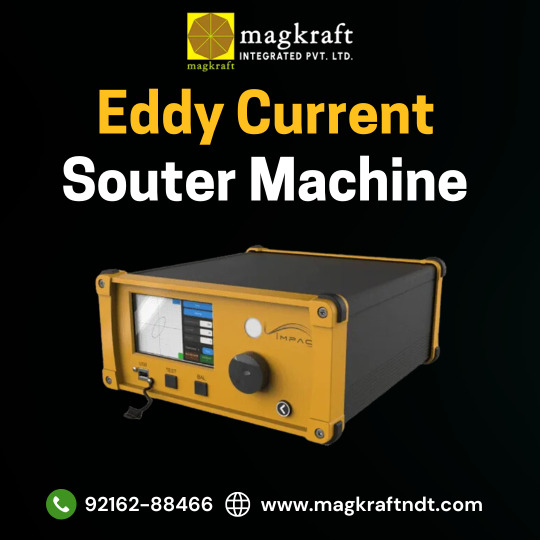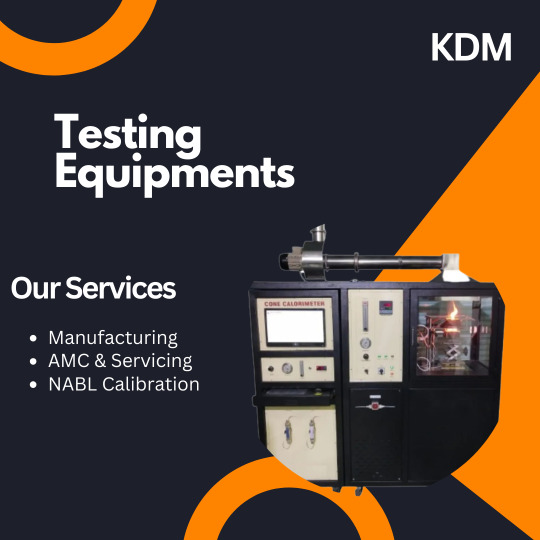#materialtesting
Explore tagged Tumblr posts
Text
Top 5 Reasons Why Material Testing Services in USA Matters for Your Business!

The strength of your products begins with reliable material testing—because quality is not an option, it is a necessity. At The Contract Lab Finder, we are committed to connecting customers with leading contract laboratories.
Are you in need of an expert Laboratory for Materials Testing? Discover trusted labs across the USA with The Contract Lab Finder. Also, if you are a laboratory, reach out to us to list your company!
#MaterialTestingServices#MaterialTesting#StructuralTesting#QualityControl#LaboratoryTesting#TestingServices#LabTesting#TestingExperts
0 notes
Text
Unmatched Strength Testing with the 2000KN Electro-Hydraulic Servo Universal Material Testing Machine

High-capacity material testing, precision, and reliability are uncompromisable. Testron's 2000KN Electro-Hydraulic Servo UTM is designed to push material limits and deliver excellent accuracy for the auto parts, aerospace, fasteners, cables, rubber, and packaging industries.
Why Testron?
1. Advanced Electro-Hydraulic Servo Oil System for unmatched stability.
2. Digital PC Servo Control for precise, real-time testing.
3. Windows-based Multi-Function Test Software for force, displacement and deformation analysis.
4. High-speed data acquisition with A/D conversion for precision engineering.
This industrial heavy-duty UTM will meet every industrial demand and ensure that your materials meet the highest quality standards.
Upgrade your testing today!
#MaterialTesting#UniversalTestingMachine#HydraulicTesting#QualityControl#StrengthTesting#LabEquipment#IndustrialTesting#MechanicalTesting#TestingMachine#TestronGroup
0 notes
Text
Eddy Current Souter Machine-Magkraftndt

The Eddy Current Souter Machine, described by Magkraft NDT, is an instrument used for nondestructive testing of conducting materials. It is designed based on the principle of eddy current testing where an alternating current generates a magnetic field that causes circulating currents in the test material. The variations of the material properties, such as conductivity or permeability, in these eddy currents allow surface and near-surface defects to be detected. This method is highly effective in inspecting metals and alloys since it provides very rapid and reliable results without jeopardizing the integrity of the components tested.
#Magkraftndt#eddycurrentsoutermachine#eddycurrentmachine#nondestructivetesting#materialtesting#testingtechnology#mpimachine#demagnetizermachine#magnafluxmachine#magneticparticletestingmachine#mpimachinemanufacturer
0 notes
Text
Stationary Metal Analysers: A Powerful Tool for Metal Analysis
Stationary metal analysers are indispensable instruments in industries requiring precise metal analysis. These devices provide highly accurate results, ensuring the quality and composition of metals used in manufacturing, construction, and other sectors.
Key Features of Stationary Metal Analysers
High Accuracy: These analysers deliver reliable results with minimal error, crucial for industries requiring precision.
Wide Application: Ideal for ferrous and non-ferrous metals, these tools are used in foundries, steel plants, and metal processing facilities.
Durability: Designed for stationary use, they are robust and suitable for continuous operation.
Advanced Technology: Equipped with Optical Emission Spectrometry (OES) or X-ray fluorescence (XRF) technology, they ensure precise measurements of metal composition.
Benefits of Using Stationary Metal Analysers
Efficiency: Quick analysis saves time in production processes.
Quality Control: Ensures that materials meet industry standards and specifications.
Cost-Effectiveness: Prevents waste by detecting impurities early in the process.
Applications
Stationary metal analysers are extensively used in sectors like:
Aerospace and automotive industries.
Metal recycling plants.
Research laboratories.
Manufacturing units focusing on alloy production.
Final Word
Stationary metal analysers play a crucial role in ensuring the accuracy and reliability of metal analysis. Their precision, durability, and efficiency make them a must-have for any industry dealing with metals. Invest in a stationary metal analyser today to enhance your operational excellence!
Looking for reliable and advanced solutions? Metal Power offers high-quality stationary metal analysers tailored to your needs. Contact Metal Power now to elevate your metal analysis processes!
0 notes
Text
Distinguish Between Industrial Furnaces and Lab Furnaces

Industrial Furnaces
Industrial furnaces are designed for large-scale applications and typically operate at higher temperatures to process metals, glass, ceramics, and other materials. They are robust, high-capacity, and optimized for continuous, high-demand production environments.
Types of Industrial Furnaces
Blast Furnace
Application: Primarily used in the steel industry for smelting iron ore into molten iron.
Size and Capacity: Capacities can exceed 1,000 tons of molten iron per day.
Temperature Range: Up to 2,200°C (3,992°F).
Benefits: Efficient for large-scale metal production.
Limitations: High energy consumption, environmental impact due to carbon emissions.
Induction Furnace
Application: Melting and refining metals like steel, copper, and aluminum.
Temperature Range: 1,200°C to 1,600°C (2,192°F to 2,912°F).
Size and Capacity: Typically ranges from 1 to 100 tons per batch, with larger systems for high-volume operations.
Benefits: Precise temperature control, high efficiency, minimal emissions.
Limitations: Requires specialized setup and significant electrical power.
Rotary Kiln Furnace
Application: Used in cement, lime, and refractory manufacturing industries.
Temperature Range: 1,000°C to 1,450°C (1,832°F to 2,642°F).
Size and Capacity: Lengths can exceed 100 meters with capacities ranging from 50 to 1,000 tons per day.
Benefits: Continuous processing, large capacity.
Limitations: High fuel consumption, requires extensive maintenance.
Electric Arc Furnace
Application: Melting scrap metal, primarily in the steel recycling industry.
Temperature Range: 1,300°C to 1,800°C (2,372°F to 3,272°F).
Size and Capacity: Can range from 5 to 400 tons per charge, depending on the size of the furnace.
Benefits: Efficient for recycling, can reach high temperatures quickly.
Limitations: High electricity consumption, potential for noise and dust pollution.
Annealing Furnace
Application: Softening metals or glass through heat treatment to improve workability.
Temperature Range: 200°C to 1,100°C (392°F to 2,012°F).
Size and Capacity: Often ranges from a few hundred to several tons, depending on the design.
Benefits: Enhances material properties, prevents metal cracking.
Limitations: Requires precise temperature control; often a slow process.
Laboratory Furnaces
Laboratory furnaces are designed for small-scale testing, research, and material development in labs. They offer precise temperature control, safety features, and are compact for benchtop or small-space applications.
Types of Laboratory Furnaces
Muffle Furnace
Application: Heating samples in ceramics, chemical, and metallurgical research.
Size and Capacity: Typically has a volume of 1 to 5 liters, suitable for small sample sizes.
Temperature Range: Up to 1,200°C (2,192°F).
Benefits: Clean heat source, ideal for ashing and incineration.
Limitations: Limited sample size, cannot be used for large-scale production.
Tube Furnace
Application: Conducting thermal processing in a controlled atmosphere, often for material synthesis and oxidation.
Temperature Range: 1,100°C to 1,800°C (2,012°F to 3,272°F).
Size and Capacity: Usually has a tube length of 60 to 150 cm, with diameters ranging from 2 to 10 cm.
Benefits: Excellent for creating precise, controlled environments.
Limitations: Small capacity; requires careful handling of gases.
Ashing Furnace
Application: Determining the mineral content in food, fuel, and other organic materials by combusting the organic matter.
Temperature Range: 600°C to 1,100°C (1,112°F to 2,012°F).
Size and Capacity: Generally ranges from 1 to 3 liters, suitable for small sample analysis.
Benefits: Accurately measures ash content, compact design for lab work.
Limitations: Limited to small samples; only suitable for specific applications.
Vacuum Furnace
Application: Heat treatment in a vacuum environment, commonly used in metallurgy and material science research.
Temperature Range: Up to 1,600°C (2,912°F).
Size and Capacity: Typically designed for small batches, with chamber sizes from 10 to 100 liters.
Benefits: Eliminates oxidation, ideal for sensitive materials.
Limitations: Expensive, requires maintenance and special equipment to handle the vacuum.
Chamber Furnace
Application: General-purpose lab furnace for heating, aging, or sterilizing samples.
Temperature Range: 100°C to 1,200°C (212°F to 2,192°F).
Size and Capacity: Usually has a capacity of 20 to 100 liters, allowing multiple samples.
Benefits: Versatile; can handle multiple samples at once.
Limitations: Limited to lower temperature ranges compared to other lab furnaces.
#IndustrialFurnaces#LaboratoryFurnaces#FurnaceTechnology#ThermalProcessing#MaterialScience#HeatTreatment#AdvancedMaterials#HighTempApplications#IndustrialEquipment#EngineeringSolutions#BlastFurnace#InductionFurnace#RotaryKilnFurnace#ElectricArcFurnace#AnnealingFurnace#MetalProcessing#CementIndustry#SteelRecycling#FurnaceDesign#HighTemperatureFurnaces#MuffleFurnace#TubeFurnace#AshingFurnace#VacuumFurnace#ChamberFurnace#LabEquipment#ThermalAnalysis#MaterialTesting#ControlledAtmosphere#LabTechnology
1 note
·
View note
Text

#testing#equipment#testingequipment#equipmentmanufacturer#firetesting#materialtesting#buildingmaterialtesting#textiletesting#testingmachine#railway#railwayvendor#railwayproduct#railwaymaterialsupplier#railwaycoach#rcoachinterior#railwaypart#fiberglassmanufacturer#compositemanufacturer#railwayconsultants#industrialmachinery#labequipment#testinglab#coachseat#laminatesupplier#railwaylaminate#rubbermanufacturer#rubberfactory#rubberindustry#lpsheet#lpsheetsupplier
0 notes
Text
Copper Purity Test Apparatus: Your Ultimate Solution for Precision Testing
When it comes to testing the purity of copper or evaluating the strength and durability of materials like plastics, precision matters. That’s where advanced testing equipment like the Universal Tensile Machine for Plastics comes in.
This state-of-the-art apparatus is designed to meet industry standards, offering unparalleled accuracy for various testing needs, including tensile strength, elongation, and material behavior. And guess what? It’s versatile enough to be used in labs performing copper purity tests too!
Universal tensile test machine are largely used as cable and plastic test equipment. The tester can complete one test with a simple five-step operation: select the existing test method, input the sample size, install the sample, start the test, and print the report. There two models with different variants of force as per the requirements of customers.
Single column UTM invariants from 0.5KN to 10KN.
Dual column UTM invariants from 1KN to 15KN.
Curious to know more about how this equipment can elevate your testing capabilities? Check out the full details here: 👉 Universal Tensile Machine for Plastics
Whether you’re working in a lab or a manufacturing facility, having the right tools makes all the difference. Explore how this machine can help you achieve better results!
0 notes
Text

Positive Material Identification (PMI) Market size at USD 2.9 billion in 2023. During the forecast period between 2024 and 2030, BlueWeave expects Global Positive Material Identification (PMI) Market size to expand at a CAGR of 9.20% reaching a value of USD 5.4 billion by 2030. Major growth factors for Global Positive Material Identification (PMI) Market include improvements in PMI equipment technology and strict government regulations for quality control. Major industries, including oil & gas, pharmaceutical, aerospace, and power generation, use PMI. The PMI approach guarantees that the right alloys are being used, avoids any product failure, and makes sure that industries adhere to the set rules and requirements, all of which contribute to the growth of Global Positive Material Identification (PMI) Market.
Sample: https://www.blueweaveconsulting.com/report/positive-material-identification-market/report-sample
Opportunity - Advancements in PMI Technology
The continuous technological advancements in PMI devices are projected to propel the growth of Global Positive Material Identification (PMI) Market in the coming years. Handheld X-ray fluorescence (XRF) and laser-induced breakdown spectroscopy (LIBS) are established technologies for assessing existing assets. The technologies are undergoing extensive advancements to boost their precision and accuracy. Advancements in XRF devices, for instance, are focused on expanding their application to detect a wider range of elements. New technologies can now identify even lighter elements, such as lithium, magnesium, and sodium, with minimal wait time, which enhances productivity and minimal wait time.
#BlueWeave#Consulting#Marketforecast#Marketresearch#PMIMarketGrowth#MaterialTesting#QualityControl#NonDestructiveTesting#ManufacturingInnovation
0 notes
Text
Mechanical CRM Samples: Enhancing Research Precision
Mechanical CRM samples are critical in ensuring accuracy and reliability in materials testing, especially in industries like metallurgy, engineering, and manufacturing. These reference materials provide a benchmark for calibrating instruments, validating methodologies, and comparing results, making them an essential resource for professionals aiming to maintain high standards in their work.
Importance of Mechanical CRM Samples
Accuracy in Measurements: They ensure precise calibration of equipment used in mechanical and material testing.
Reliability: Establish consistent test results across different laboratories and testing environments.
Compliance: Help industries meet international standards and regulatory requirements.
Applications of Mechanical CRM Samples
Material Testing: Verifying the strength, hardness, and durability of metals and alloys.
Instrument Calibration: Ensuring testing machines like spectrometers, tensile testers, and hardness testers deliver accurate readings.
Research & Development: Supporting innovations by providing reliable benchmarks during experiments.
Choosing the Right Mechanical CRM Samples
When selecting reference materials, consider the following:
Certified Standards: Opt for samples certified by recognized bodies to ensure reliability.
Relevance: Choose materials that match your testing requirements and align with industry standards.
Comprehensive Documentation: Ensure the samples come with detailed data sheets for reference.
Reference Materials and Their Role
Reference materials, such as mechanical CRMs, are indispensable for maintaining quality and precision in testing processes. By integrating certified reference samples into your workflows, you can achieve higher accuracy and build credibility in your results.
Boost your testing capabilities with mechanical CRM samples and align with global best practices! Looking for high-quality certified reference materials? Contact MPPL Standards today to explore our comprehensive range of mechanical CRM samples.
#MechanicalCRM#CertifiedReferenceMaterials#MaterialTesting#testingstandards#MPPLStandards#precisiontesting
0 notes
Text
Material Analysis Services - Vee Technologies
Vee Technologies offers industry-best material analysis services. We thoroughly evaluate material quality and provide the necessary insights that help to prevent failure and improve performance.
Explore More: https://www.veetechnologies.com/industries/engineering-services-and-solutions/product-engineering-manufacturing/mechanical-testing-prototyping/material-analysis.htm

#engineeringsolutions#productdevelopment#materialanalysis#engineeringexperts#veetechnologies#QualityControl#MaterialTesting#IndustrialTesting
0 notes
Text
Maximize Material Strength with the 300KN Electro-Hydraulic Servo Universal Material Testing Machine

Precision meets power in Testron's 300KN Electro-Hydraulic Servo UTM for auto parts, aerospace, fasteners, cables, rubber and packaging industries, designed to deliver flawless material testing.
Top-of-the-line Features:
1. A professionally designed system mounted on cylinders allows for compact, easy operation.
2. Advanced electro-hydraulic servo oil source for stable and reliable performance.
3. a complete digital PC servo control system is needed for exact testing with digital PID regulation.
4. Multifunctional Test Software: Advanced data display, automatic processing, and high-speed acquisition through a Windows OS.
From analysis of force and displacement data to deformation data analysis—getting accurate, reliable, and repeatable results every time is a promise that cutting-edge technology at Testron gives. Take your capabilities in testing beyond the ordinary.
𝗙𝗼𝗿 𝗺𝗼𝗿𝗲 𝗶𝗻𝗳𝗼𝗿𝗺𝗮𝘁𝗶𝗼𝗻:
Email: [email protected]
Product: https://testrongroup.com/product/tt-eh0300-300kn-electro-hydraulic-servo-universal-material-testing-machine/
Website: https://testrongroup.com/
#MaterialTesting#UniversalTestingMachine#HydraulicTesting#QualityControl#TestingEquipment#StrengthTesting#LabTesting#MechanicalTesting#TensileTesting#TestronGroup
0 notes
Text
Magnetic Crack Detector Inspection Machine -Magkraftndt

A Magnetic Crack Detector Inspection Machine detects surface cracks in metal materials by applying a magnetic field. It highlights defects using iron powder or dye, helping to ensure the quality and safety of metal components in industries like manufacturing and aerospace.
#magkraftndt#magneticcrackdetectorinspectionmachine#Metalinspection#aerospacetesting#materialtesting#mpimachine#demagnetizermachine#magneticparticletestingmachine#eddycurrenttestingmachine#coneyortypedemagnetizermachine#mpimachinemanufacturer.
0 notes
Text
Aluminium Testing: Ensuring Quality and Reliability
Aluminium is a widely used metal known for its lightweight, strength, and corrosion resistance. To ensure the reliability and quality of aluminium products, aluminium testing plays a vital role. This process evaluates the metal’s composition, properties, and performance, helping industries meet required standards.
Importance of Aluminium Testing
Testing aluminium is crucial for:
Metal Analysis: Determining the chemical composition of aluminium to ensure it meets industry-specific requirements.
Quality Assurance: Ensuring the material adheres to standards for strength, durability, and performance.
Safety Compliance: Identifying impurities or inconsistencies that could compromise safety.
Common Aluminium Testing Methods
Optical Emission Spectrometry (OES): A fast and accurate method for detailed metal analysis.
X-Ray Fluorescence (XRF): Non-destructive testing to analyze the elemental composition.
Mechanical Testing: Examining tensile strength, hardness, and elasticity.
Corrosion Testing: Assessing the metal’s resistance to environmental conditions.
Applications of Aluminium Testing
Industries like automotive, aerospace, construction, and packaging rely on aluminium testing to:
Ensure product durability and reliability.
Meet regulatory standards and certifications.
Enhance production efficiency by identifying quality issues early.
Final Thoughts
Accurate metal analysis and aluminium testing are essential to maintaining high standards in manufacturing and industrial applications. By leveraging advanced testing techniques, businesses can ensure superior product quality and performance.
If you’re looking to enhance your aluminium testing capabilities, adopting modern analytical tools and methods is a wise investment. Explore Metal Power’s cutting-edge solutions to achieve precise metal analysis and superior testing results. Contact Metal Power today to transform your testing processes!
#metalpower#AluminiumTesting#metalanalysis#materialtesting#qualityassurance#TestingTechniques#AluminiumQuality
0 notes
Text

Fison Haze Meter measures haze and transmittance with an open measurement area for any sample size. It features vertical and horizontal measurements, a 400-700 nm wavelength range, and uses CIE-A, CIE-C, D65 light sources. Compact, portable, and fast with a 5-inch display.
0 notes
Text
Test Sieves Manufacturers and Suppliers in Delhi, India
Test Sieves Manufacturers and Suppliers in Delhi, India. 0ffering a wide range of durable and precise sieves for various industries. Humidity Chamber Manufacturers.












#delhimanufacturers#TestSieves#TestSievesDelhi#SievesManufacturers#SievesSuppliers#LabSieves#SieveShakers#QualitySieves#PrecisionSieves#IndustrialSieves#LaboratorySieves#SieveTesting#DelhiSuppliers#TestSieveIndia#SieveMesh#MaterialTesting#LabEquipment#MeshScreens#DelhiManufacturers#SievingSolutions#TestingEquipment
0 notes
Text

🔍 Ensure Material Strength with Hardness Testing! 🛠️
At Best NDT Inspection, we provide reliable Hardness Testing services to measure the strength and durability of materials. Whether it's metals, alloys, or other components, our precise testing methods ensure that your products meet the required standards of quality and performance.
Strengthen your quality assurance with our expert Hardness Testing services!
📞 Contact us today at Best NDT Inspection to learn more.
Visit us:https://www.bestndtinspection.com/
Contact Us:+65-84797783
0 notes